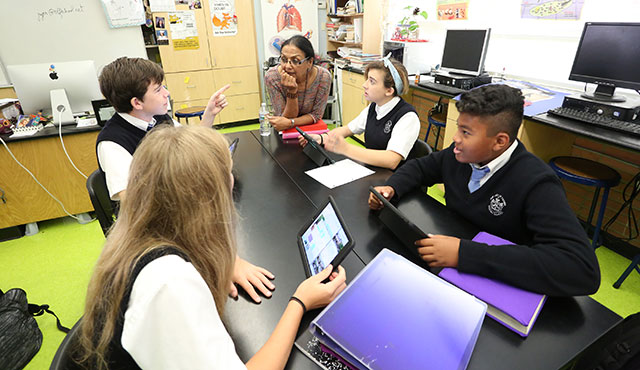The Diocese of Orange official peeked inside the room and took in the unusual scene:
A group of elementary school teachers dissecting a squid.
A few years ago, it was training time for several fourth- and fifth-grade teachers in a unique pilot program, the Discovery Science Academy.
The DSA is designed to increase the quality of STEM (Science, Technology, Engineering and Math) education for pupils at Orange County’s 34 elementary and three diocesan parish high schools.
And Sally Todd, now interim superintendent of schools for the Diocese of Orange, was there to witness the program’s launch in 2015.
Now, officials involved in the privately funded partnership between the diocese, the Discovery Cube OC and the University of Notre Dame Center for STEM Education are touting the success of the DSA, calling it one of the best-kept secrets in Orange County’s Catholic community.
“It’s been highly, highly successful,” says Todd.
Under the program, teachers receive 20-plus hours of hands-on training and take that knowledge back to the classroom.
An evaluation of data from the 2015-16 academic year showed that students’ proficiency in STEM classes increased between 30 and 50 percent, says Joe Adams, chief executive officer of the nonprofit Discovery Science Foundation.
“We’re leading the way,” says Adams, referring to a movement among Catholic parish schools to keep pace with – and even exceed – STEM standards the state establishes for public schools.
The DSA was a response, in part, to the recognition that diocesan parish schools weren’t keeping up with their public counterparts when it came to education standards in science, technology, engineering and mathematics, Adams says.
Now, in Orange County at least, Catholic parish schools are crushing it, he adds.
The evaluation data of the DSA program is from as assessment of fourth-grade students and teachers, but it’s illustrative of the efficacy of the entire program, whose standards are “robust and challenging,” says Matt Kloser, director of the University of Notre Dame Center for STEM Education.
In a video message to DSA officials, Kloser says 70 percent of O.C. teachers participating in the DSA felt the training was a “great” use of their time and the other 30 percent rated it “very good.”
In addition, 70 percent said they would “highly recommend” other teachers to participate, and 30 percent said they would recommend the program. No one said they wouldn’t recommend it, Kloser says.
“What (the results) say to me is there is great hope that students in our schools have the opportunity to engage in the amazing questions about the world around them…and see themselves as people who can engage in these disciplines,” Kloser says.
“What I love about the DSA curriculum is they meet this challenge (of STEM standards) – they don’t back down,” he adds.
There’s a nationwide movement for students to learn what is known as the next generation of science standards, Adams says. And these new standards involve much more than the old-school strategy of rote memorization of concepts.
“For some teachers whose expertise isn’t science, it’s a little scary,” Adams says. “The teachers themselves have to understand the (new standards). They need to make sure the students all know what’s going on and that they’re not falling behind.”
DSA started with fourth- and fifth-graders but now also includes sixth-, seventh- and eighth-graders.
Todd has visited several DSA classes to see students learning such concepts as centrifugal force and how electricity works.
“There was a lack of reliable, valuable materials for our schools in relation to the new state standards,” Todd says, referring to STEM education. “We needed a kick start.”
Now, Todd says, O.C. diocesan parish students are flourishing when it comes to education in the hard sciences.
“They are experiencing hands-on training and improving their critical thinking,” Todd says. “They love it. They’re highly engaged.”
Instrumental in making the DSA a reality was Rich Linting, a parishioner at St. Catherine of Siena in Laguna Beach and a University of Notre Dame alumnus.
Linting says he recognized that Catholic elementary schools in Orange County were lagged behind in STEM education and he wanted to do something about it.
So he met with Adams, another Notre Dame alumnus, and thus began the seeds of the DSA.
“The DSA and its results are an incredibly positive and compelling message on STEM education that is being delivered to students at Catholic elementary schools,” Linting says.
Up to now, the DSA has been privately funded.
Adams and Todd say they aren’t aware of any other diocese that has something similar to DSA.
Says Todd of the partnership between the Diocese of Orange, the Discovery Cube OC and the University of Notre Dame Center for STEM Education:
“It’s a perfect marriage.”

